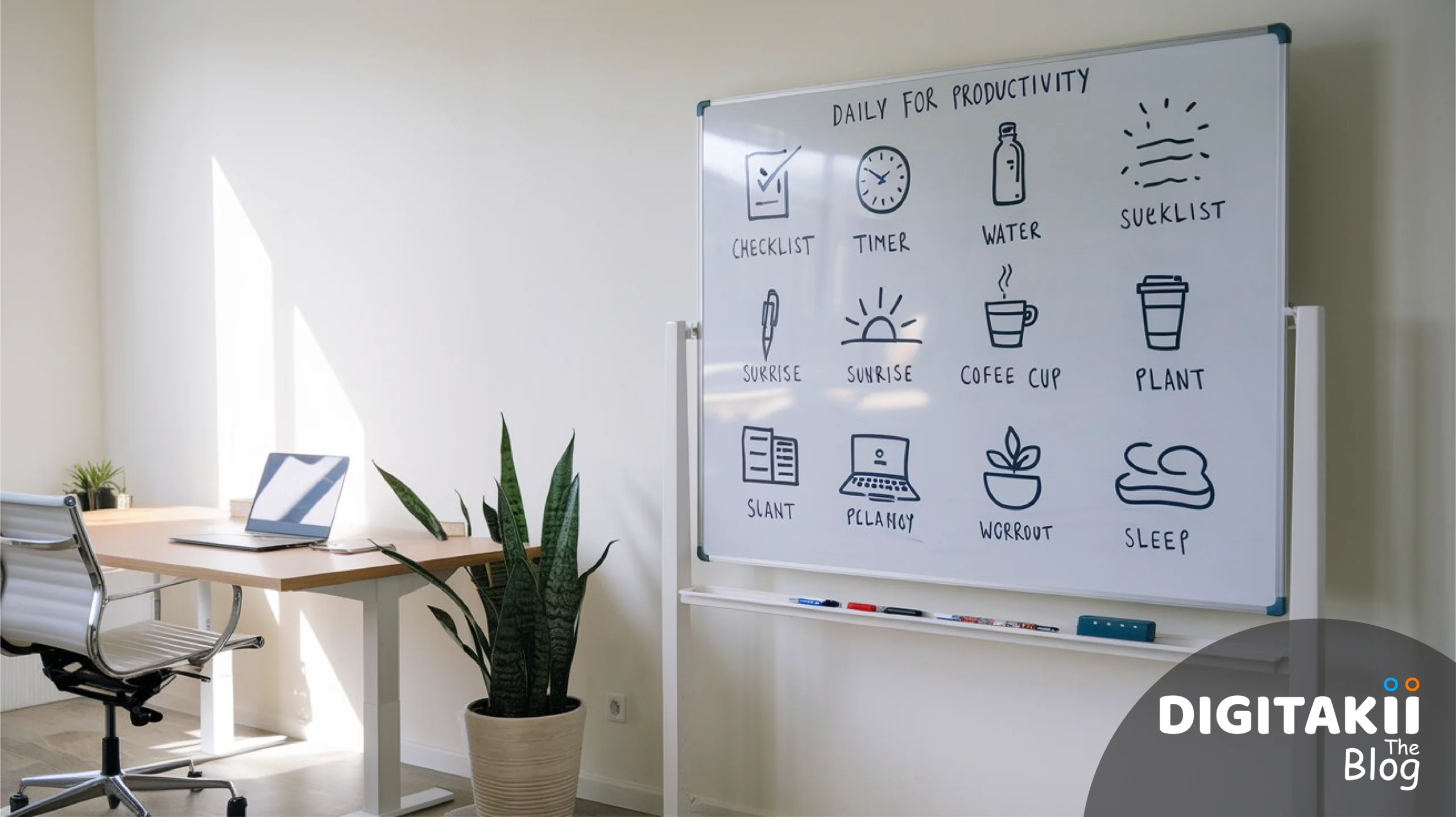We’ve all had those days where we feel like there aren’t enough hours to get everything done. You’ve got your to-do list, but somehow you find yourself overwhelmed or constantly distracted. Over the years, I’ve discovered that being productive isn’t about working longer hours or pushing yourself to the brink of exhaustion. It’s about implementing simple, daily habits that transform the way you work and live. These habits, when practiced consistently, can skyrocket your productivity and help you achieve more without burning out.
So, whether you’re struggling with procrastination, distraction, or just feeling stuck, this guide will show you 10 daily habits that can make a real difference in your life.
1. Start Your Day with a Morning Routine
It’s no secret that many successful people swear by their morning routines. A structured start to the day sets the tone for productivity and focus. When you wake up and jump straight into work or life’s chaos, it can feel overwhelming. A good morning routine can include things like:
- Hydration: Drink a glass of water right after you wake up. It wakes up your system and starts your metabolism.
- Meditation or Mindfulness: Spend 5–10 minutes focusing on your breath, clearing your mind, and setting your intentions for the day.
- Exercise: Whether it’s a 10-minute stretch or a full workout, moving your body early in the morning helps boost your energy and concentration.
By creating a consistent routine that works for you, you’re taking charge of your day before it takes charge of you.
2. Prioritize Your Tasks with the 3 MITs
There’s nothing worse than ending your day feeling like you haven’t achieved anything substantial. One thing I swear by is setting 3 MITs (Most Important Tasks) every day. These are the tasks that will have the biggest impact on your progress. Instead of trying to do everything at once, focus on knocking out these critical tasks early.
Once you finish your MITs, you’ll feel accomplished and can handle smaller, less urgent tasks with ease. This habit helps you stay focused on what truly matters rather than getting caught up in busywork.
3. Time Blocking
Time blocking is one of the most effective ways to ensure you’re spending your time wisely. The idea is simple: schedule specific blocks of time for different tasks or types of work. During those blocks, focus solely on that task.
For example, you might block two hours in the morning for deep work, an hour in the afternoon for emails, and 30 minutes for social media. This keeps you from multi-tasking, which we all know can be a productivity killer.
- Pro tip: Set a timer during each block, and don’t let yourself get distracted. Whether it’s the Pomodoro technique (25 minutes on, 5 minutes off) or 90-minute work blocks, find a rhythm that works for you.
4. Use the Two-Minute Rule
The two-minute rule, coined by productivity expert David Allen, is a game changer. The rule is simple: if a task will take less than two minutes to complete, do it immediately. These are often things like responding to an email, filing a document, or cleaning up your workspace.
By tackling these quick tasks right away, you prevent them from piling up and overwhelming you later. You’ll be surprised how much time you save when you knock out small tasks on the spot.
5. Take Breaks with the Pomodoro Technique
If you’ve ever found yourself zoning out after working for hours, you know how crucial breaks are for productivity. The Pomodoro Technique is one of the best methods to manage your work and rest intervals.
The concept is simple:
- Work for 25 minutes (one “Pomodoro”).
- Take a 5-minute break.
- After four Pomodoros, take a longer 15- to 30-minute break.
This approach helps keep your brain fresh and prevents burnout, ensuring you’re always working at your peak productivity.
6. Review and Reflect at the End of the Day
At the end of each day, take 10–15 minutes to review your progress. Ask yourself:
- What did I accomplish today?
- Did I finish my MITs?
- What can I improve tomorrow?
Reflecting on your day not only gives you a sense of accomplishment but also helps you identify areas for improvement. You might find that certain tasks took longer than expected, or maybe you were more productive in the morning than the afternoon. Use this insight to refine your habits.
7. Keep Your Workspace Clutter-Free
A cluttered workspace often leads to a cluttered mind. When your desk is covered in papers, sticky notes, and random knick-knacks, it’s hard to focus on the task at hand. Keeping a clean, organized workspace is a small but significant habit that boosts your productivity.
- Tip: At the end of each day, spend five minutes tidying up your desk. File away papers, throw out trash, and get your workspace ready for a fresh start tomorrow.
8. Batch Similar Tasks Together
Instead of jumping between different types of work, try batching similar tasks together. For example, if you need to respond to emails, make phone calls, and do research, group these activities together rather than spacing them out. Batching helps reduce mental fatigue from constantly switching between different modes of thinking.
Here’s how it might look:
- Batch all your emails and administrative work in the morning.
- Schedule all meetings and phone calls in the afternoon.
- Reserve creative or strategic tasks for a dedicated block of time.
This kind of structure can help you streamline your workflow and get more done with less mental effort.
9. Use Technology Mindfully
Technology can be both a blessing and a curse when it comes to productivity. On one hand, apps and tools can make your life easier. On the other hand, constant notifications, social media, and the temptation to multitask can drain your focus.
Be mindful of how you use technology. Tools like Trello, Todoist, or Notion are great for organizing your tasks, but be disciplined about when and how you use them. Turn off non-essential notifications, and set specific times to check email or social media.
10. Get Enough Sleep and Rest
We live in a world where being busy is often glorified, but lack of sleep is one of the quickest ways to tank your productivity. When you’re well-rested, your mind is sharp, your energy levels are high, and you can focus more effectively.
Make sleep a priority by:
- Establishing a consistent bedtime routine.
- Creating a relaxing sleep environment (dark, cool, and quiet).
- Limiting screen time before bed to improve sleep quality.
When you prioritize rest, you’ll notice that you can achieve more in less time because your brain and body are operating at their best.
Bonus: Stay Hydrated
It’s a simple habit that’s often overlooked: drinking enough water throughout the day. Dehydration can lead to fatigue, headaches, and difficulty concentrating, all of which can tank your productivity. Keep a water bottle on hand and make sure you’re sipping throughout the day.
FAQs: Skyrocketing Your Productivity with Daily Habits
1. How long does it take to form a productive habit?
Most experts agree it takes about 21 to 66 days to form a habit, depending on the complexity of the task and your level of commitment. Consistency is key. Start small and gradually build up to more significant changes.
2. Can these habits work for both personal and professional productivity?
Absolutely! These habits are versatile and can be applied to both your personal and professional life. Whether you’re working on a project at work or trying to balance responsibilities at home, they’ll help you stay focused and organized.
3. What’s the most important habit for productivity?
It’s hard to choose just one, but many people find that prioritizing their MITs has the biggest impact. When you focus on completing the most important tasks first, you ensure that you’re moving closer to your goals each day.
4. Is multitasking bad for productivity?
Yes, multitasking often reduces productivity because it forces your brain to switch between tasks, which can slow you down. It’s more effective to focus on one task at a time using techniques like time blocking or task batching.
5. What’s the best way to avoid distractions while working?
Create a distraction-free environment by silencing your phone, using focus apps, and practicing time blocking. Break your work into manageable chunks and take regular breaks to maintain your concentration.
6. How can I stay motivated to stick with these habits?
Motivation can ebb and flow, but building a routine and creating accountability can help. Start with small, manageable changes and celebrate your progress. Over time, these habits will become second nature.
Conclusion
Building productive habits doesn’t require major life overhauls. Instead, it’s about incorporating small, consistent changes that have a big impact over time. From starting your day with intention, to batching tasks and prioritizing sleep, these habits can transform how you approach your work and life. Try adding one or two of these habits to your daily routine and see how your productivity skyrockets!
Hashtags: #ProductivityTips #DailyHabits #FocusAndAchieve #SkyrocketProductivity #EfficiencyHacks #OrganizedLife #TimeManagement #WorkSmartNotHard #Digitakii #DigitakiiTheBlog
===============================
Ready to dominate the digital world? 🚀💻
Don’t just exist online – THRIVE! At www.digitakii.com, we’re your secret weapon for digital success.
🌐 Stunning websites that convert 📱 Social media that sizzles 🔍 SEO that skyrockets your visibility 📊 Data-driven strategies for real results
Why blend in when you can stand out? Let’s craft your digital masterpiece together!
👉 Visit www.digitakii.com now and let’s make some digital magic! ✨
#DigitalMarketing #DigitalPresence #DigitalMarketingAgency
===============================



